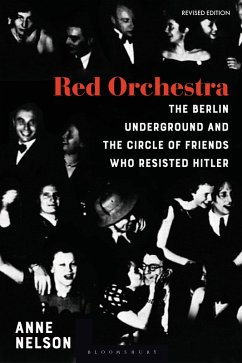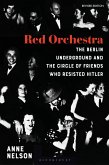For years, the history of the anti-Nazi resistance in Germany was hidden and distorted by Cold War politics. Providing a much-needed corrective, Red Orchestra presents the dramatic story of a circle of German citizens who opposed Hitler from the start, choosing to stay in Germany to resist Nazism and help its victims. The book shines a light on this critical movement which was made up of academics, theatre people, and factory workers; Protestants, Catholics and Jews; around 150 Germans all told and from all walks of life.
Drawing on archives, memoirs, and interviews with survivors, award-winning scholar and journalist Anne Nelson presents a compelling portrait of the men and women involved, and the terrifying day-to-day decisions in their lives, from the Nazi takeover in 1933 to their Gestapo arrest in 1942. Nelson traces the story of the Red Orchestra (Rote Kapelle) resistance movement within the context of German history, showing the stages of the Nazi movement and regime from the 1920s to the end of the Second World War. She also constructs the narrative around the life of Greta Kuckhoff and other female figures whose role in the anti-Nazi resistance fight is too-often unrecognised or under appreciated.
This revised edition includes:
* A new introduction which explores elements of the Red Orchestra's experience that resonate with our times, including: the impact of new media technologies; the dangers of political polarization; and the way the judiciary can be shaped to further the ends of autocracy. The introduction will also address the long-standing misconception that the German Resistance only took action when it was clear that Germany was losing the war.
* Historiographic updates throughout the book which take account of recent literature and additional archival sources
Drawing on archives, memoirs, and interviews with survivors, award-winning scholar and journalist Anne Nelson presents a compelling portrait of the men and women involved, and the terrifying day-to-day decisions in their lives, from the Nazi takeover in 1933 to their Gestapo arrest in 1942. Nelson traces the story of the Red Orchestra (Rote Kapelle) resistance movement within the context of German history, showing the stages of the Nazi movement and regime from the 1920s to the end of the Second World War. She also constructs the narrative around the life of Greta Kuckhoff and other female figures whose role in the anti-Nazi resistance fight is too-often unrecognised or under appreciated.
This revised edition includes:
* A new introduction which explores elements of the Red Orchestra's experience that resonate with our times, including: the impact of new media technologies; the dangers of political polarization; and the way the judiciary can be shaped to further the ends of autocracy. The introduction will also address the long-standing misconception that the German Resistance only took action when it was clear that Germany was losing the war.
* Historiographic updates throughout the book which take account of recent literature and additional archival sources









